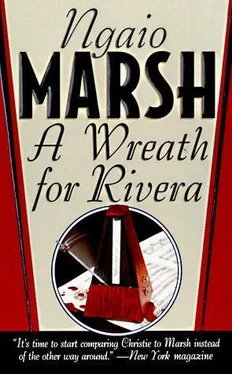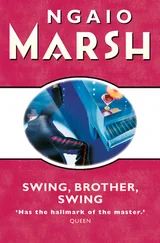With a faint grin Alleyn moved upstairs and Carlisle, after a moment’s hesitation, followed him.
They were all in the drawing-room. Lady Pastern, still in evening dress and now very grey about the eyes and mouth, sat in a chair near the door. Félicité, who had changed into a housecoat and reduced her make-up, looked frail and lovely. Edward had evidently been sitting near her and had risen on Alleyn’s entrance. Lord Pastern, with his coat off and his sleeves turned up, sat at a table in the middle of the room. Sheets of paper lay before him and he had a pencil between his teeth. A little removed from this group, her hands folded in the lap of her woollen dressing gown and her grey hair neatly braided down her back, sat Miss Henderson. A plain-clothes officer stood inside the door. Carlisle knew all about him. He was the man who had escorted them home: hours ago, it seemed, in another age. She had given him the slip when she returned to the Metronome and now wondered, for the first time, how dim a view the police would take of this manoeuvre. The man looked awkwardly at Alleyn, who seemed about to speak to him as Carlisle entered, but stood aside to let her pass. Edward came quickly towards her. “Where have you been?” he said angrily. “What’s the matter? I — ” He looked into her face. “Lisle,” he said. “What is it?”
Lord Pastern glanced up. “Hello,” he said. “Where the devil did you get to, Lisle? I want you. Sit down.”
“It’s like a scene from a play,” she thought. “All of them sitting about exhausted, in a grand drawing-room. The third act of a thriller.” She caught the eye of the plain-clothes officer, who was looking at her with distaste.
“I’m sorry,” she said. “I’m afraid I just walked out by the back door.”
“I realize that, miss,” he said.
“We can’t be in two places at once, can we?” Carlisle added brightly. She was trying to avoid Félicité. Félicité was looking at her anxiously, obviously, with inquiring eyebrows.
Lord Pastern said briskly: “Glad you’ve come, Alleyn, though I must say you’ve taken your time about it. I’ve been doin’ your job for you. Sit down.”
Lady Pastern’s voice, sepulchral with fatigue, said: “May I suggest, George, that as in all probability this gentleman is about to arrest you, your choice of phrase is inappropriate.”
“That’s a damn tiresome sort of thing to say, C,” her husband rejoined. “Gets you nowhere. What you want,” he continued, darting his pencil at Alleyn, “is a time-table. You want to know what we were all doin’ with ourselves before we went to the Metronome. System. All right. I’ve worked it out for you.” He slapped the paper before him. “It’s incomplete without Breezy’s evidence, of course, but we can get that to-morrow. Lisle, there are one or two things I want from you. Come here.”
Carlisle stood behind him and looked at Alleyn. His face was politely attentive, his eyes were on Lord Pastern’s notes. In her turn and in response to an impatient tattoo of the pencil, she too looked at them.
She saw a sort of table, drawn up with ruled lines. Across the top, one each at the head of nine columns, she read their names: her own, Lady Pastern’s, Félicité’s, Edward’s, Lord Pastern’s, Bellairs’s, Rivera’s, Miss Henderson’s, and Spence’s. Down the left-hand side, Lord Pastern had written a series of times, beginning at 8:45 and ending at 10:30. These were ruled off horizontally and in the spaces thus formed, under each name, were notes as to the owner’s whereabouts. Thus, at “9:15 approx” it appeared that she and Lady Pastern had been in the drawing-room, Miss Henderson on her way upstairs, Félicité in the study, Rivera in the hall, Lord Pastern and Breezy Bellairs in the ballroom, and Spence in the servants’ quarters.
“The times,” Lord Pastern explained importantly, “are mostly only approximate. We know some of them for certain but not all. Thing is, it shows you the groupin’. Who was with who and who was alone. Method. Here y’are, Lisle. Go over it carefully and check up your entries.”
He flung himself back in his chair and ruffled his hair. He reeked of complacency. Carlisle took up the pencil and found that her hand trembled. Exhaustion had suddenly overwhelmed her. She was nauseated and fuddled with fatigue. Lord Pastern’s time-table swam before her. She heard her voice saying, “I think you’ve got it right,” and felt a hand under her arm. It was Alleyn’s. “Sit down,” he said from an enormous distance. She was sitting down and Ned, close beside her, was making some sort of angry protest. She leant forward, propping her head on her hands. Presently it cleared and she listened, with an extraordinary sense of detachment, to what Alleyn was now saying.
“… very helpful, thank you. And now, I’m sure, you’ll all be glad to get to bed. We shall be here during what’s left of the night — hardly anything, I’m afraid, but we shan’t disturb you.”
They were on their feet. Carlisle, feeling very sick, wondered what would happen if she got to hers. She looked at the others through her fingers and thought that there was something a little wrong, a little misshapen, about all of them. Her aunt, for instance. Why had she not seen before that Lady Pastern’s body was too long and her head too big? It was so. And surely Félicité was fantastically narrow. Her skeleton must be all wrong: a tiny pelvis with the hip-bones jutting out from it like rocks. Carlisle’s eyes, behind their sheltering fingers, turned to Lord Pastern and she thought how monstrous it was that his forehead should overhang the rest of his face — a blind over a shop window; that his monkey’s cheeks should bunch themselves up when he was angry. Even Hendy: Hendy’s throat was like some bird’s and now that her hair was braided one saw that it was thin on top. Her scalp showed. They were caricatures, really, all of them. Subtly off-pitch: instruments very slightly out of tune. And Ned? He was behind her, but if she turned to look at him, what, in the perceptiveness born of nervous exhaustion, would she see? Were not his eyes black and small? Didn’t his mouth, when it smiled, twist and show canine teeth a little too long? But she would not look at Ned.
And now, thought the bemused Carlisle, here was Uncle George at it again. “I’ve no intention of goin’ to bed. People sleep too much. No need for it: look at the mystics. Workin’ from this time-table I can show you…”
“That’s extremely kind of you, sir.” Alleyn’s voice was clear and pleasant. “But I think not. We have to get through our routine jobs. They’re dreary beyond words and we’re best left to ourselves while we do them.”
“Routine,” shouted Lord Pastern. “Official synonym for inefficiency. Things are straightened out for you by someone who takes the trouble to use his head and what do you do? Tell him to go to bed while you gallop about his house makin’ lists like a bumbailiff. Be damned if I’ll go to bed. Now!”
“Oh, God!” Carlisle thought desperately. “How’s he going to cope with this?” She felt the pressure of a hand on her shoulder and heard Ned’s voice.
“May I suggest that whatever Cousin George decides to do there’s no reason why the rest of us should keep a watch of supererogation.”
“None at all,” Alleyn said.
“Carlisle, my dear,” Lady Pastern murmured as if she were giving the signal to rise from a dinner party. “Shall we?”
Carlisle stood up. Edward was close by and it seemed to her that he still looked angry. “Are you all right?” he asked.
“Perfectly,” she said. “I don’t know what possessed me. I got a bit run-down in Greece and I suppose — ” Her voice died. She was thinking of the long flight of stairs up to her room.
Читать дальше






